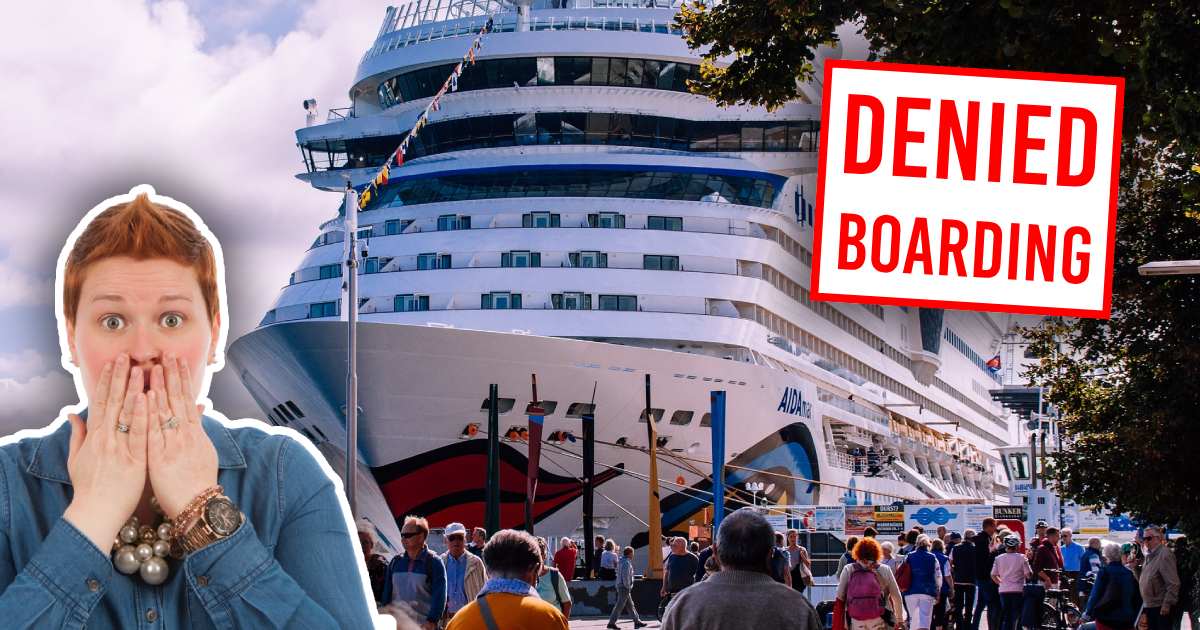Imagine your horror arriving at the cruise terminal only to be denied boarding. But you thought your travel documents were in order, you paid in full for the cruise, and you didn’t have banned items in your luggage. Then, the security officer tells you that your passport must be valid for six months after the cruise ends. What! You didn’t know that. What was supposed to be a dream vacation has turned into a nightmare.
Being denied boarding means more than missing out on an exotic cruise. You cannot get a refund and face a logistical headache to travel home. How can you avoid being left at the cruise terminal watching the ship sail into the sunset without you?
I’ll share 14 reasons cruise lines can refuse boarding in this article. I’ve scoured countless cruise forums and blogs to discover all the reasons—from the blatantly obvious to the obscure few passengers know. Knowing these reasons will help you never face the embarrassment of hearing the words: “I’m sorry, you cannot board the ship.”
Reasons Cruise Lines Don’t Let Cruisers Board the Ship
As you stand at check-in, brimming with excitement, you hand over your documents. The cruise staff check your passport and travel documents. But their expression changes, and they check again. Your heart skips a beat—did you make a silly booking mistake? Then they smile and say, “Have a nice voyage.” Relieved, you almost skip down the gangway.
That’s the experience most cruisers have before boarding. However, on almost every cruise, some passengers get denied boarding. Please read on to learn how to avoid being one of them.
Arriving too late at the cruise terminal

Arriving after the final boarding time is a surefire way to be denied boarding. I’ve heard of passengers who missed their cruise because they confused the boarding time with the ship’s departure time. Remember, cruise ships won’t wait for latecomers, no matter the excuse. Double-check your boarding and final boarding times to avoid disappointment.
Based on my experience and tips from fellow cruisers, here’s how to make sure you aren’t left behind, standing on the dock watching the ship sail away. First, I strongly recommend arriving at the embarkation port at least a day before departure. I once witnessed a couple racing through the terminal, dragging their luggage with panic etched on their faces. They barely made it because their flight was delayed and heavy traffic compounded the problem. This stressful situation is far too common, and it’s entirely avoidable by arriving a day in advance.
Also, aim to reach the terminal at least two hours before your boarding time. From my own travels, I can’t stress enough the importance of allowing extra time for traffic, roadworks, or detours on the way to the terminal. It’s far better to spend some relaxed extra time at the port than to risk missing your cruise entirely. Don’t let your ‘bon voyage’ become a ‘non-voyage’ due to delays that could have easily been avoided.
Expired or invalid passports
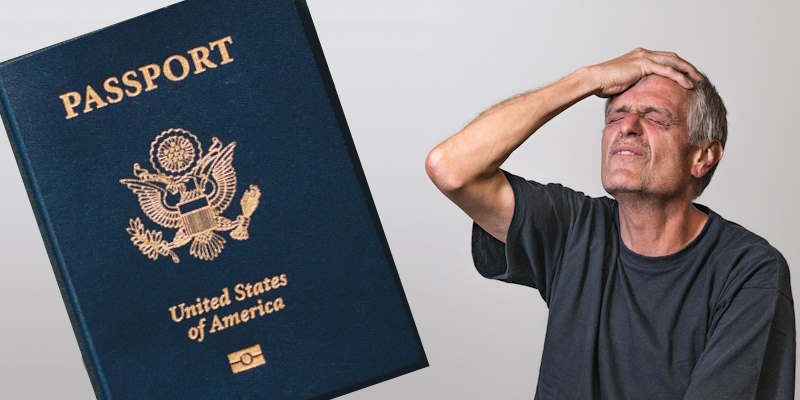
One of the most common reasons for denial of boarding is because the passport has expired or is about to expire. Did you know that your passport must be valid for six months from the last day of your cruise? Cruise lines state: “Guests who do not bring the correct documents may be denied boarding with no refund.”
The major cruise lines recommend using a passport for travel, and your name must match your reservation documents. Other forms of I.D. may be OK, but a passport is always the best travel document.
It’s best to avoid the mistake that some passengers made on a 10-day Princess Caribbean cruise. They had a birth certificate as I.D., which is OK for some cruises. However, they were denied boarding at Fort Lauderdale because the cruise itinerary included stops in Central and South America and the Panama Canal, which required a passport.
Your cruise contract clearly states that it’s the passenger’s responsibility to check they have proper documentation for all stops on the voyage. Remember: no valid travel I.D., no cruise vacation, period.
Missing or incorrect travel visas
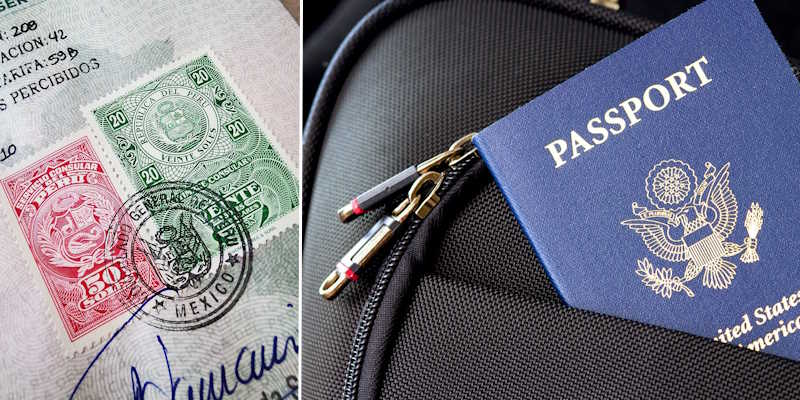
Not checking visa and entry requirements for all ports of call can result in being denied boarding at check-in. Some first-time cruisers assume that their passport is sufficient for cruising. However, they forget they may require visas depending on their citizenship or nationality.
Here’s a real-life boarding scenario I witnessed at check-in. A passenger traveling on a U.K. passport thought they had the correct documentation. They had their USA ESTA visas, which allowed them to enter the U.S. However, they didn’t realize on the Alaskan cruise they’d also need a Canadian ESTA or visa, as Vancouver is one of the cruise ports.
Unfortunately, they were denied boarding with no refund and a long, expensive flight back to the United Kingdom. The lesson? Double-check entry requirements for each port of call.
For example, a Mediterranean cruise could stop at cruise ports in the European Union and non-EU countries. Therefore, you may need multiple visas to ensure successful boarding at the embarkation port.
Inaccurate or incomplete booking information

Incorrect booking details or even a simple typo can delay your check-in or result in being denied boarding. In my experience, it’s crucial that your reservation details match your passport exactly. I remember one cruiser sharing how they were denied boarding simply because they forgot to include their middle name on the reservation.
If you’re going on a honeymoon cruise or have recently changed your name, mismatched details can create complications. From my own trips, I recommend taking all necessary official documentation with you—birth certificates, marriage licenses, and other forms of I.D. I’ve even heard of travelers bringing a divorce certificate just to be on the safe side, though they weren’t asked for it.
Always keep these essential documents in your carry-on luggage, as you might need to present them to security staff to prove your identity. If you’re recently married, divorced, or have changed your name, consider booking your cruise through a travel agent. From my experience, having an agent keeps you informed about all the necessary documentation, reducing the risk of an oversight that could ruin your vacation.
No travel insurance
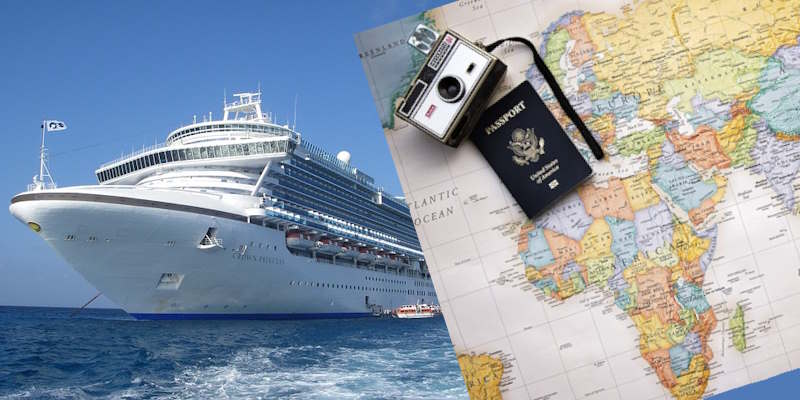
Travel insurance is necessary on some cruise lines and some destinations. For example, I discovered that P&O Cruises requires all UK passengers to have an adequate travel insurance policy before boarding. Also, some Alaska or polar cruises may stipulate you purchase sufficient insurance before the trip.
Most cruisers realize that a travel insurance policy is essential when going on a cruise. It covers you financially for injuries, last-minute cancellations, medical assistance, and even if you miss the boat.
Criminal records

A criminal record could prevent you from boarding a cruise ship. After researching the question, I discovered no hard-fast rules about entry to specific ports. It seems that U.S. citizens with criminal convictions or old DUIs may have problems cruising in Alaska, as Canada is always a port of call.
Some cruisers told me about a friend who was denied boarding because the cruise ship was going to Jamaica. However, I heard from others that they’ve had no issues entering Jamaica or other Caribbean islands despite having criminal convictions.
But remember, cruise lines do background checks on passengers. And it doesn’t matter if you decide to stay on the ship. You’ll be denied boarding if you cannot enter a port of call.
Experienced cruisers generally advise researching each cruise port on the itinerary thoroughly to ensure that a criminal record won’t deny entry. However, many convicted felons say they’ve been on Royal Caribbean, Norwegian Cruise Line, and Carnival Cruise Line without issues.
According to Carnival Cruise Line terms and conditions, passengers with the following criminal convictions may be denied boarding:
- Aggravated assault
- Robbery
- Murder
- Sexual assault and other sexual offenses
- Criminal convictions discovered through a background check
Bad behavior, intoxication, or safety concerns

Any passenger turning up at check-in who is heavily intoxicated, disruptive, or acting aggressively risks being denied boarding. I remember standing in line, and the passenger at check-in had partied too much the night before. He then became aggressive when the cruise line denied boarding. Security was called, and they took him away.
Cruise lines have a zero-tolerance policy for unruly guests and will refuse boarding to anyone posing a threat. Additionally, fighting, aggressive behavior, and over-intoxication onboard are not tolerated. These are some common reasons why some passengers get kicked off a cruise ship.
The cruise line could also ban you from boarding future cruises.
Failing to consent to security screening
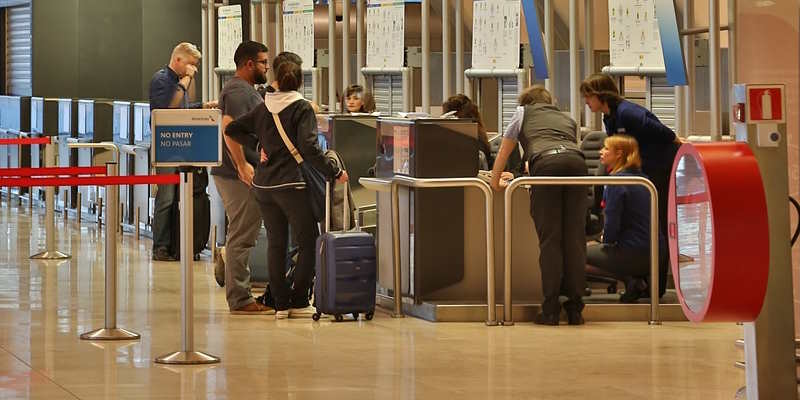
Security screenings are compulsory for all passengers boarding a cruise ship. The Royal Caribbean website says: “Refusal to participate in the security screening or provide a security photo may result in denial of boarding or removal from the vessel.” Security checks can also be performed at each port of call. Failure to participate results in a non-refunded cruise voyage.
During the security screening, staff are looking for contraband like smuggled booze, weapons, drugs, and electrical items. Did you know there are things you can take on a plane but not a cruise ship?
Smuggling banned items onboard

Cruise lines can deny boarding if you have banned items in your luggage. Sometimes, the staff may let you dispose of the offending item before boarding. These items are usually things like hard liquor, knives, or firearms. However, in some cases, they may not let you board the ship.
If they find illegal items like drugs, cruise staff will call the authorities. So, you could end up spending the first night of your vacation cooped up in a police cell, not your comfortable stateroom.
Carnival’s cruise contract states that any cruise passenger smuggling banned items on board “may be denied boarding or reboarding or disembarked and no refund of any portion.”
Is it lawful in your state to use recreational drugs or CBD products? If so, don’t consider trying to bring any on board. USA Today reported that a woman was banned from Carnival Cruise Line for life because of having a pack of CBD gummies in her carry-on.
Pregnancy restrictions

Cruise lines have strict policies regarding pregnancy. Most cruise contracts state that pregnant women must complete the voyage by their 24th week of pregnancy. If you arrive at check-in and are pregnant, staff will ask for a letter from your doctor or midwife stating you’re in good health to travel and the estimated time of delivery.
One news report told the story of an Australian woman who tried to board a cruise ship in her 26th week. It was a three-day cruise, and she assumed it would be OK. She also had the all-clear from her obstetrician. However, she was denied boarding and didn’t get her $2,000 fare refunded.
Health or quarantine regulations

Turning up at check-in with signs of a severe illness could be a reason for denial of boarding. Additionally, cruise lines ask passengers to complete a pre-embarkation health questionnaire. For example, Royal Caribbean says guests who refuse to provide health information or knowingly lie about their health condition may be denied boarding.
Although many restrictions on showing flu-like symptoms have been relaxed, the Royal Caribbean health and safety policy in 2023 stated that they can “deny boarding to any guest exhibiting symptoms of communicable diseases.” And their decision is at their “sole discretion.”
Not having parental consent

Are you traveling with someone under 18 who’s not your child? Let me share a lesson I learned the hard way: if you don’t have a notarized consent letter from both parents or guardians, you won’t be allowed to board. A fellow passenger I met had to cancel her cruise plans because she didn’t bring this crucial document for her niece. Trust me, it’s not just a suggestion—it’s a firm requirement on every cruise line I know.
If your child has a different last name—for example, if you’re divorced and remarried or if the child is adopted—you must bring official documentation to prove the relationship. I once saw a family at the port frantically searching their bags for their child’s adoption papers. To avoid this stress, make sure you have all necessary documents ready, such as birth certificates, divorce certificates, or adoption certificates.
As someone who’s dealt with this before, let me tell you: you can never over-prepare when it comes to documentation. Cruise forums and personal experience alike confirm this—when you think you’ve got enough, bring even more.
The cruise line overbooked the ship
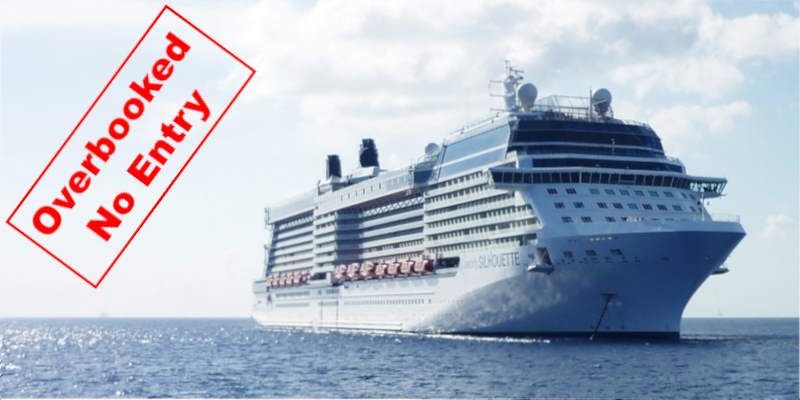
Imagine turning up at check-in on boarding day only to be told that the ship is overbooked and you cannot sail. Although rare, cruise lines sometimes overbook cabins as airlines do with flights. They sell more tickets than they have space for, anticipating last-minute cancellations because they want to sail at full capacity. However, if no one cancels, some unlucky passengers get bumped.
One news story reported that dozens of passengers were denied boarding due to an overbooked Royal Caribbean cruise ship. In this case, the passengers received a full refund and future cruise credits worth their full fare.
If you’re bumped from a cruise due to overbooking, most cruise lines will compensate you with a full refund, future cruise credits, and sometimes accommodations. However, don’t settle for the initial cruise line offer. Push them for more compensation.
The news report in question said that Royal Caribbean initially offered 25 percent off a future cruise. Only when one couple pushed harder did they get a free future cruise and a deluxe drink package. After all, it’s the cruise line’s fault you have lost vacation time—make them pay.
Traveling with an infant

Parents-to-be may be concerned about bringing an infant with them. Unfortunately, you’ll be denied boarding if you arrive at check-in with an infant under six months old on cruise day. If the cruise itinerary includes three or more consecutive sea days, the child must be at least 12 months old. The same applies to ocean crossings and sailing to Hawaii and some South American countries.
Royal Caribbean states in their infant policy: “Guests traveling with a young infant that does not meet the infant policy will be denied boarding.”
This question appears commonly on cruise forums. Some cruisers book cruises two years in advance to lock in the best deals. However, in the meantime, they hope to add to their family. So, they put TBA on the cabin booking for the unborn baby. However, the child must be at least six months old when it’s time to sail.
What Happens if You’re Denied Boarding?
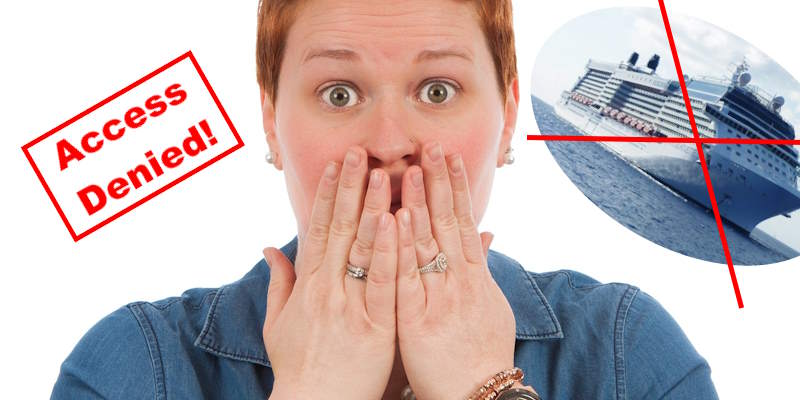
Being denied boarding at the cruise terminal can be devastating. Cruise lines don’t offer refunds or cruise credits if you’re to blame for the denial of boarding. Cruise contracts clearly state that you are responsible for ensuring you have the correct travel documents and abide by their terms and conditions.
Many experienced cruisers also advise not to trust information on the cruise line’s website regarding the correct documentation. It’s up to you to ensure you’ve got the proper visas and meet entry requirements for each port of call. One cruiser was denied boarding due to the wrong advice they received from the cruise line’s official help center.
What about claiming travel insurance if you’re denied boarding? In most cases, you’re out of luck. Most insurance policies don’t pay out if boarding denial was your fault. This includes incorrect documentation, aggressive behavior, or traveling when over 24 weeks pregnant. Your only hope is if you have Cancel For Any Reason insurance.
The One Thing Every Cruiser Should Know Before Boarding—And It’s Not What You Think
Cruising isn’t always smooth sailing, and being denied boarding is a nightmare no one wants. Remember: preparation is everything. From valid travel documents to travel insurance, knowing all the potential pitfalls is crucial. Before you embark, make sure you’re fully informed.
For more valuable tips on cruise preparation, check out what you can bring on a plane but not a cruise ship, common reasons cruisers miss their ship, and expert travel insurance tips for cruisers. Also, be sure to learn what smart cruisers do on embarkation day and discover secrets cruise lines don’t want you to know.

